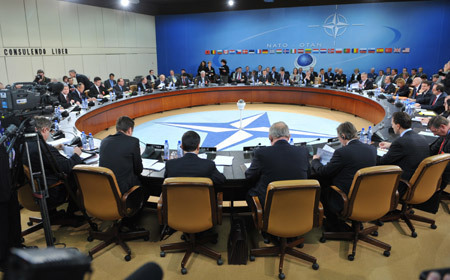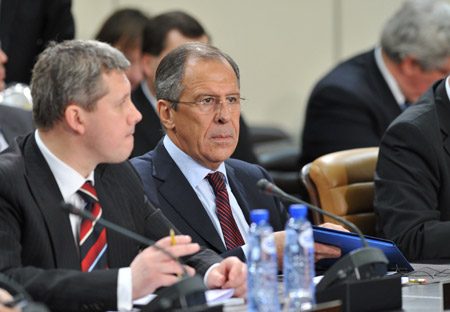Global General
NATO rally to Obama Afghanistan troop request
(Xinhua)
Updated: 2009-12-05 13:59
|
 A meeting of foreign ministers of the NATO-Russia Council is held at the NATO headquarters in Brussels Dec. 4, 2009.[Xinhua] |
BRUSSELS: NATO allies and partner nations rallied Friday to US President Barrack Obama's call for an international military surge in Afghanistan, by adding at least 7,000 troops to the 30,000 fresh US soldiers due to deploy next year in what could be the last chance to stem the rising tide of Taliban violence.
"Despite all the challenges, all the uncertainties and all the casualties, they remain absolutely united about this mission," said NATO Secretary General Anders Fogh Rasmussen after talks with foreign ministers from the 44 nations contributing to the mission in Afghanistan.
The extra international troops, combined with the growing Afghan National Army, will mean the US and its allies will have about 300,000 soldiers on the ground next year, outnumbering the Taliban insurgents by over ten-to-one, according to NATO estimates.
Fogh Rasmussen said the injection of more firepower plus a switch in strategy designed to undermine local support for the Taliban means success is in reach. Obama has set a July 2010 target for international forces to begin a gradual withdrawal and handover to Afghan forces.
However, with public support in many countries skeptical about the chances of success and increasingly opposed to the war, NATO officials are keenly aware that this may be their last chance to get the Afghan strategy right. They know that failure would be a potential fatal blow to NATO credibility that risks Afghanistan emerging as a terrorist haven and a threat to nuclear-armed Pakistan.
Fogh Rasmussen said at least 25 nations have committed to deploy additional troops in 2010. "This is a significant contribution by our NATO partners," said US Secretary of State Hillary Clinton. "I am heartened by the level of additional help we have received."
The international force has been growing steadily in Afghanistan since US-led forces toppled the Taliban regime in 2001. However, they have failed to halt the insurgency as remnants of the Taliban regime that has been reinvigorated by profits from the narcotics trade and recruits from Afghans disillusioned with continued poverty and widespread government corruption.
| ||||
New contributions made public over the past few days include 1,000 from Italy, 600 from Poland, 500 from Britain, 240 from Slovakia, 125 from Albania and 100 each from Romania, Portugal and the Czech Republic. Turkey, which has resisted calls to send more combat troops beyond the 720 it has on the ground, said it would deploy about 60 more experts to train Afghan soldiers. Several non-NATO nations also said they would send fresh troops including Georgia with 900, South Korea with 400, Sweden and Australia with 125 each and Colombia with 84.
"This is a resounding vote of confidence in the strategy that has been set out by President Obama," said British Foreign Secretary David Miliband. "It's a very clear commitment from the international community."
More commitments are expected on Monday at a force generation conference held at NATO's military headquarters in southern Belgium.
Notably missing from the list of new contributors however were Germany and France. Both of them are considering sending more training units for the Afghan army and police, but are reluctant to deploy extra combat units.
"We are willing to do more for training the police to help add to security," German Foreign Minister Guido Westerwelle told reporters. "A debate that is reduced to the question of how many troops -- yes or no to more -- is from our point of view neither constructive nor appropriate."
|
 Russian Foreign Minister Sergei Lavrov (2nd L) attends the NATO-Russia Council meeting at the NATO headquarters in Brussels Dec. 4, 2009.[Xinhua] |
French Foreign Minister Bernard Kouchner expressed skepticism that the new American strategy would bring short-term benefits, but he left open the possibility that France might strengthen its current contingent of 3,000 if necessary.
French and German officials have hinted they may review their position after an international conference on Afghanistan scheduled for Jan. 28 in London. NATO diplomats are hopeful pledges after that meeting could take allied contributions up to the 10,000 initially requested by US commanders. The German parliament agreed Thursday to renew the mandate of the country's current contingent of 4,400 troops in northern Afghanistan.
Pressure is also growing on Canada and the Netherlands who have set deadlines in 2011 and end 2010 for the withdrawal of their troops. Canada's 2,830 soldiers and the Dutch contingent of 2,160 have been playing a key role in some of the most violent parts of southern Afghanistan, but faced with public opposition their governments are planning to pull out them out.
Clinton signaled out the Dutch for particular praise, saying their policy of "Defense, Diplomacy and Development" had been a model for the new US strategy. The Dutch practice of focusing more on support for development and protection of local communities in Uruzgan province was once criticized by US commanders as being too soft on the Taliban.
Now many of the ideas developed by the Dutch to reach out to the local population are being expanded under McChrystal's strategic review. The NATO-led International Security Assistance Force in Afghanistan currently has 83,467 troops. In addition, the United States has around 20,000 troops there outside the NATO command and the Afghan National Army's current strength stands at 134,000. NATO ministers sought to allay concerns about Obama's announcement on Tuesday of a July 2011 target for the beginning of a drawdown of US and other international forces as Afghan forces take over more responsibility for the county's security.
"Transition does not mean exit. There should be no misunderstanding," said Fogh Rasmussen. "We are not going to leave Afghanistan to fall back into the hands of terrorists and extremists ... It will not be a run for the exit."







